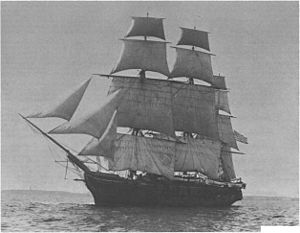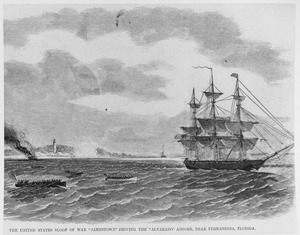USS Jamestown (1844) facts for kids
 |
|
Quick facts for kids History |
|
|---|---|
| Name | USS Jamestown |
| Namesake | Jamestown, Virginia |
| Launched | 1844 |
| Commissioned | 12 December 1844 |
| Decommissioned | 11 May 1854 |
| Fate | Became a Marine Hospital, destroyed in a fire on 3 January 1913 |
| Recommissioned | 22 February 1855 |
| Decommissioned | 2 June 1857 |
| Recommissioned | 16 December 1857 |
| Decommissioned | 14 February 1860 |
| Recommissioned | 5 June 1861 |
| Decommissioned | 17 September 1865 |
| Recommissioned | 3 September 1866 |
| Decommissioned | 13 August 1868 |
| Recommissioned | 25 January 1869 |
| Decommissioned | 7 October 1871 |
| Recommissioned | 16 March 1876 |
| Decommissioned | 3 March 1879 |
| Recommissioned | 8 May 1879 |
| Decommissioned | 21 September 1881 |
| Recommissioned | 14 February 1882 |
| Decommissioned | 31 August 1888 |
| Recommissioned | 13 April 1889 |
| Decommissioned | 6 September 1892 |
| Fate |
|
| General characteristics | |
| Type | Sloop |
| Displacement | 1,150 long tons (1,168 t) |
| Length | 163 ft 6 in (49.83 m) |
| Beam | 32 ft 2 in (9.80 m) |
| Depth | 17 ft 3 in (5.26 m) |
| Complement | 186 officers and sailors |
| Armament |
|
The first USS Jamestown was a sloop-of-war (a warship with one gun deck) in the United States Navy. It served during important times in American history, including the Mexican–American War and the American Civil War.
Jamestown was built in 1844 at the Gosport Navy Yard in Virginia. It officially joined the Navy on December 12, 1844, with Commander Robert B. Cunningham in charge.
Contents
Adventures of the USS Jamestown
Stopping the Slave Trade and Helping Ireland (1845–1850)
Jamestown began its first mission on June 25, 1845. It sailed from Hampton Roads to the western coast of Africa. Its main job there was to help stop the slave trade, which was illegal. The ship returned to Boston, Massachusetts, on August 6, 1846.
While in Boston, the United States learned that the potato crop in Ireland had failed for the second year in a row. This caused a terrible famine, leaving many people without food. The U.S. Congress decided to help. On March 3, 1847, they allowed Jamestown and another ship, Macedonian, to carry food to Ireland. Jamestown left Boston on March 28 and arrived in Cork, Ireland, on April 12. After delivering its important cargo, the ship sailed back to Boston, arriving on May 17.
Later, on July 22, Jamestown returned to the west coast of Africa. A year after that, it moved to the Mediterranean Sea. Here, its job was to protect American citizens and their interests during the revolutions happening across Europe in 1848. Once things calmed down, Jamestown returned to Norfolk, Virginia, on May 4, 1850.
Missions in South America, Africa, and the West Indies (1851–1860)
After a year at home, Jamestown was sent to the Brazil Squadron. It left Norfolk on June 1, 1851, to operate off the coast of South America. This mission lasted until May 2, 1854, when it returned to the Philadelphia Navy Yard. It was taken out of service nine days later.
Jamestown was put back into service on February 22, 1855. It became the main ship for the African Squadron and left Key West on June 9. It returned to Philadelphia on June 2, 1857, and was taken out of service again. The ship was recommissioned on December 16 and sailed through the West Indies with the Home Squadron. It was taken out of service once more in Philadelphia, Pennsylvania, on February 14, 1860.
Serving in the Civil War (1861–1865)
When the American Civil War began, Jamestown was recommissioned on June 5, 1861. It joined the Atlantic Blockading Squadron. This squadron's job was to stop Confederate ships from getting supplies. Jamestown was very successful in this role.
- On August 5, it chased the ship Alvarado ashore near Fernandina, Florida, and set it on fire.
- On August 31, 1861, it captured the schooner Aigburth off the coast of Florida.
- Four days later, it captured, took apart, and sank the schooner Colonel Long.
- On December 15, it captured the schooner Havelock.
- Its last capture was the ship Intended, taken near Wilmington, North Carolina, on May 1, 1862.
On October 12, Jamestown sailed to the Pacific Ocean. Its new mission was to protect American trade ships from Confederate privateers (private ships allowed to attack enemy ships). It stayed on this duty until the war ended, and was taken out of service at Mare Island on September 17, 1865.
Pacific Missions and Alaska (1866–1881)
After the war, Jamestown was changed into a transport and supply ship. It was recommissioned on September 3, 1866, to serve in Panama as a supply and hospital ship. Due to illness on board, Jamestown was ordered north on April 2, 1867, and was cleaned in San Francisco, California.
It then joined the North Pacific Squadron. From September 11, 1867, to May 30, 1868, it served as a guard and supply ship at Sitka, Alaska. Jamestown was present when the U.S. Flag was raised in Sitka on October 18, 1867, after Alaska was bought from Russia.
Jamestown arrived at Mare Island on July 23, 1868. It was taken out of service on August 13 and then recommissioned on January 25, 1869, after repairs. For almost three years, Jamestown sailed the Pacific Ocean. It visited the west coasts of North and South America, and traveled as far west as Tahiti and the Fiji and Hawaiian Islands.
On October 7, 1871, Jamestown was taken out of service and stored at Mare Island. It was recommissioned on March 16, 1876, to be used as a State Public Marine School ship. It operated in the Hawaiian Islands for this purpose until it was returned to the Navy and taken out of service on March 3, 1879.
It was recommissioned again on May 8 and sailed to Sitka, Alaska. There, it surveyed the harbor and protected American interests. In 1881, it sailed the Pacific until it was taken out of service in San Francisco on September 21.
Training and Hospital Ship (1882–1913)
Jamestown was then set up as a training ship for new sailors. It was recommissioned on February 14, 1882, and sailed to the Atlantic coast by going around Cape Horn. In its new role, it sailed the Atlantic Ocean, visiting the West Indies, Spain, and even as far north as Maine.
While at the Brooklyn Navy Yard on December 20, 1883, two sailors, J. W. Norris and Robert Augustus Sweeney, bravely jumped overboard to rescue a man from drowning. For their courage, they were each given the Medal of Honor. On August 31, 1888, Jamestown was taken out of service at Norfolk.
It was recommissioned on April 13, 1889, and sailed to France and the West Indies with its apprentice sailors. It was taken out of service for the last time on September 6, 1892, at Norfolk.
On September 9, 1892, Jamestown was given to the Treasury Department. It was used by the Marine Hospital Service for quarantine purposes in Hampton Roads. This meant it helped prevent the spread of diseases. The ship was sadly destroyed by fire at the Norfolk Navy Yard on January 3, 1913, after being returned to the Navy Department.
Images for kids
 | Janet Taylor Pickett |
 | Synthia Saint James |
 | Howardena Pindell |
 | Faith Ringgold |




